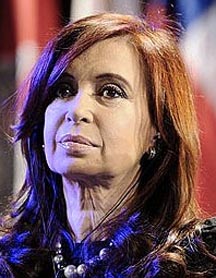MADRID, (Reuters) – An incensed Spain threatened swift economic retaliation against Argentina yesterday after it announced plans to seize YPF, the South American nation’s biggest oil company, in a move which pushed down shares in Spanish energy giant Repsol, the controlling shareholder.

Madrid called in the Argentine ambassador in a rapidly escalating row over the nationalisation order by Argentina’s populist and increasingly assertive president, Cristina Fernandez, a move which delighted many of her compatriots but alarmed some foreign governments and investors.
Promising action in the coming days, Spanish industry minister Jose Manuel Soria said: “With this attitude, this hostility from the Argentine authorities, there will be consequences that we’ll see over the next few days. They will be in the diplomatic field, the industrial field, and on energy.” “Argentina has shot itself in the foot,” said Foreign Minister Jose Manual Garcia-Margallo.
Despite the rhetoric, Spain appeared to have little leverage over Buenos Aires – any action to be taken will be determined at a cabinet meeting on Friday – and Argentina has proven impervious to such pressure in the past. Repsol said YPF was worth $18 billion as a whole and it would be seeking compensation on that basis, but the Spanish oil major’s shares fell by 7.5 percent in Madrid yesterday.
The company said it could raise money in the bond market and sell some assets to help its cash flow. Repsol described Argentina’s move as “clearly unlawful and seriously discriminatory” and said it would take legal action. “This battle is not over,” Repsol Chairman Antonio Brufau said. “The expropriation is nothing more than a way of covering over the social and economic crisis facing Argentina right now.” But Fernandez dismissed the risk of reprisals. “This president isn’t going to respond to any threats … because I represent the Argentine people. I’m the head of state, not a thug,” she said.
European Commission President Jose Manuel Barroso said he expected Argentina to uphold international agreements on business protection with Spain. “I am seriously disappointed about yesterday’s announcement,” he said in Brussels. But action against Argentina appeared limited in scope. The EU Trade Commissioner would write to Argentina’s trade minister to “reiterate our serious concerns” while an EU-Argentine meeting this week would be postponed. “It’s absolutely shameful considering everything that Spain has done for Argentina,” said a woman called Domi, who was filling her tank at a Repsol petrol station in Madrid. “I hope the government takes measures and does something serious. They’ve pulled our leg long enough!”




